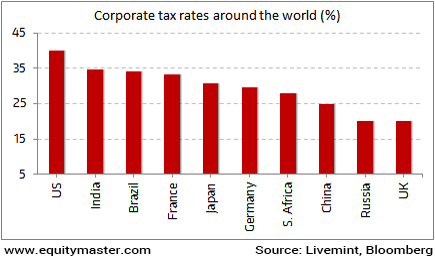India's Third Giant Leap
This Could be One of the Biggest Opportunities for Investors
- Home
- Todays Market
- Indian Stock Market News January 16, 2017
Sensex Trades Marginally Higher; Realty Stocks Witness Buying Mon, 16 Jan 11:30 am
After opening the day on a flat note, the Indian share markets have continued to trade marginally higher. Sectoral indices are trading on a mixed note with stocks in the realty sector and consumer durables sector witnessing maximum buying interest.
The BSE Sensex is trading up 32 points (up 0.1%) and the NSE Nifty is trading flat. The BSE Mid Cap index is trading up by 0.4%, while the BSE Small Cap index is trading up by around 0.6%. The rupee is trading at 68.15 to the US$.
As per an article in the Economic Times, the government is looking to tweak the definition of the infrastructure sector in the upcoming budget to include low-cost or affordable housing. This change is being proposed about a month after Prime Minister Narendra Modi announced concession on interest rates for low-cost housing loans under the Pradhan Mantri Aawas Yojana.
Mr Modi, in his address to the nation on December 31, 2016, announced an interest rate subvention of 3% and 4% for loans up to Rs 12 lakh and Rs 9 lakh under the Prime Minister Awas Yojana.
This may seem positive for affordable housing and realty sector after the blow of demonetisation. However, there remain many challenges before India will see affordable housing picking up, such as high land prices, high state-level taxes, and lack of builders for affordable housing. Right now the "Housing for All" initiative by the government still seems a distant dream.
For affordable housing to gain traction, the cost of constructing homes needs to fall. For this to happen, first and foremost, the cost of land in and around cities needs to fall.
For the cost of land to fall, the government needs to increase supply. This can be done by increasing the FSI allowed on buildings. Further, the government needs to increase supply of land by trying to sell some of the land that it owns in and around cities, land that it inherited from the British colonial administration.
Furthermore, as Vivek Kaul said, there should be a formal rental market for the above initiatives to succeed.
These will be the first few steps towards affordable housing and the government's dream of "Housing For All By 2022".
Apart from the above, the upcoming budget is also said to bring cheer to both individuals and corporate taxpayers. This comes as the government looks to lift sentiment in the wake of demonetisation.
On the cards is a revamp of the income-tax framework for individuals and a reduction in the corporate tax rate to encourage companies to invest.
As of now, our corporate tax rate stands at almost 35%, which is the second highest in the world. This can be seen in the chart below:
Indian Corporate Tax Rate Amongst Highest in the World
That said, one must also note companies get a whole raft of exemptions. As per the government claims, these exemptions bring the effective tax rate of India Inc. down to just 23%.
This being the case, as we look towards the upcoming Union Budget for 2017-18, the need of the hour is to get rid of the complicated layers of exemptions and to have a simple and uniform tax rate much lower than the current one. This will not only make for better tax compliance by companies, but also make it easier for the tax department to administer appropriate tax collections as well as reduce tax litigation.
For information on how to pick stocks that have the potential to deliver big returns, download our special report now!
Read the latest Market Commentary



Equitymaster requests your view! Post a comment on "Sensex Trades Marginally Higher; Realty Stocks Witness Buying". Click here!
Comments are moderated by Equitymaster, in accordance with the Terms of Use, and may not appear
on this article until they have been reviewed and deemed appropriate for posting.
In the meantime, you may want to share this article with your friends!